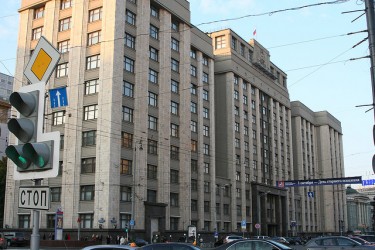Le 25 avril, la Douma russe a voté une loi [russe] qui rétablit l’élection des gouverneurs des sujets fédéraux russes [français] par les électeurs, mettant fin à une politique de nominations directes par le président. Cette loi est l’une des différentes concessions accordées par le président Dmitri Medveded à la suite des manifestations de la place Bolotnaya [français], l’hiver dernier.
Cependant, le 28 avril, Medvedev a accepté la démission [ru] des gouverneurs du Kraï de Perm [fr] et de l’oblast de Iaroslavl [fr]. Ces démissions ont indigné les blogueurs de l’opposition qui soupçonnent le Kremlin de revenir sur ses promesses d’assouplir sa main mise sur le pouvoir central.
La Fédération de Russie est composé de 83 “sujets fédéraux”, mélange de républiques, d’oblasts et de kraï, dotés de différents degrés d’autonomie. Durant les décennies tumultueuses qui ont suivi l’effondrement de l’Union Soviétique, certains d’entre eux ont obtenu une marge conséquente d’indépendance. D’autres, comme la République tchétchène, ont tenté de quitter définitivement la Fédération.

Vladimir Poutine, lors de son premier mandat de président, a renforcé l’autorité centrale, une stratégie qui a culminé en 2005 avec les nominations des gouverneurs fédéraux, jusqu’alors élus. Ces nominations étaient la pierre angulaire du “pouvoir vertical” voulu par Poutine et un retour à des élections paraissait par conséquent une réforme bienvenue.
Les blogueurs russes ont commencé à s’interroger sur ces réformes alors même que le nouveau texte de loi effectuait son parcours législatif au sein de la Douma. Ils ont rappelé les démissions récentes de plusieurs gouverneurs et la nomination par interim de nouveaux.
Certaines de ces démissions, comme celle du gouverneur de longue date de l’oblast de Moscou, Boris Gromov, sont particulièrement suspectes. Le mandat du gouverneur Gromov arrivant à son terme en 2012, il pouvait perdre son siège lors de nouvelles élections.

Mais avec la nomination de son remplaçant, ces élections n’auront pas lieu avant cinq ans. Le blogueur et activiste de l’opposition Oleg Kozyrev qualifie ceci de “vol électoral ” [ru] et de plan délibéré de tromperie.
Et de fait, 6 des 14 gouverneurs dont les sièges auraient du être pourvus lors d’élections en 2012 [russe] ont démissionné à ce jour. Cependant, ce n’est qu’avec la démission de Oleg Chirkunov à Perm et la nomination de Viktor Basargin par intérim que l’opinion publique s’est manifestée de façon plus importante.
Alors que le mandat de Chrikunov courait jusqu’en 2015, il a décidé qu’il démissionnerait de façon anticipée afin de permettre la tenue d’élections [russe]. Mais en raison de cette démission, remise plus tôt qu’attendu, la plupart des analystes pensent que Basargin sera nommé gouverneur.
Comme l’a confié le stratège politique Gleb Pavlovsky à un site de Perm, une fois que Basargin sera en place, “il dirigera la région, que Perm le veuille ou non.” [ru]
Les habitants du kraï de Perm considèrent cela comme une trahison, affirme une résolution [ru] publiée par la Coalition pour des élections directes de Perm [ru] :
Le remplacement du dirigeant de la région par le recours à une vieille procédure…est une insulte politique et un manque de respect envers les citoyens…d’une région de trois millions d’habitants qui a mérité ces élections et s’y prépare déjà activement.
La colation a utilisé les médias sociaux pour organiser une marche de protestation le 1er mai, dans le cadre de la campagne lancée pour s’assurer que les élections auront lieu.
Tout le monde n’interprète pas cette épidémie de démissions comme uniquement une tentative de repousser les élections locales de quelques années [ru]. Si six des démissions sont celles de gouverneurs arrivant en fin de mandat, six autres gouverneurs ont démissionné sans être menacés par ce type d’échéances. Et même si l’ancien ministre Shoigu a été nommé pour remplacer Gromov dans l’oblast de Moscou, des sondages montrent qu’il aurait du remporter le siège, note un blogueur de Echo Moskvy, Boris Nadezhdin [ru].
L’économiste et blogueur Sergei Aleksashenko pense que Chirkunov a été poussé dehors en raison de ses résultats décevants lors des récentes élections parlementaires russes [ru]. En effet, les gouverneurs démissionnaires partagent un point commun : le parti de Poutine, Russie Unie, qui a remporté moins de 40% des suffrages dans ces régions en décembre dernier [ru].
D’un certain point de vue, cette hypothèse est la pire. Si les “démissions” se révèlent être des sanctions pour de piètres performances électorales ou pour un refus de falsifier les résultats des élections, le Kremlin pourrait bien être en train de consolider son pouvoir, et non pas de le déléguer.
For further information on the topic, please view the following publications from our partners:
Farewell to the Liberal Technocrat? Reassessing Medvedev’s Foreign Policy Legacy, from the Centre for European Policy Studies.
Duma Elections and Protests, from the Center for Security Studies.
The Aftermath of the 2011 Duma Elections: Moving to Russia 2.0, from the Portuguese Institute for International Relations and Security.
For more information on issues and events that shape our world please visit the ISN’s Security Watch and Editorial Plan.

